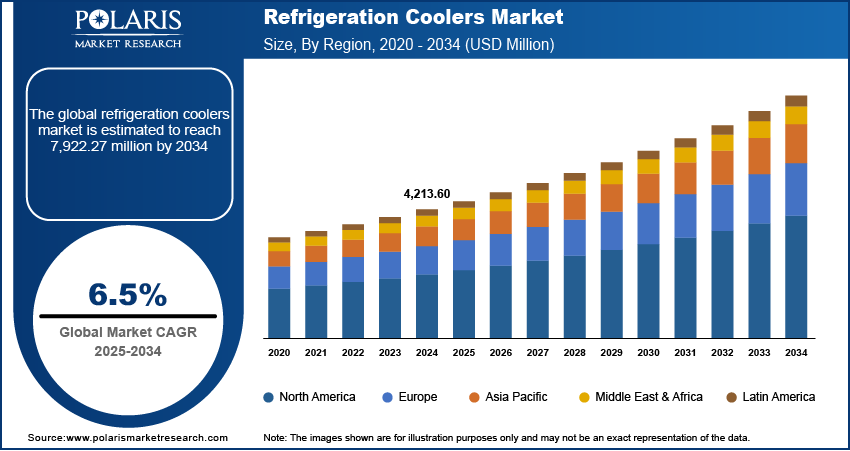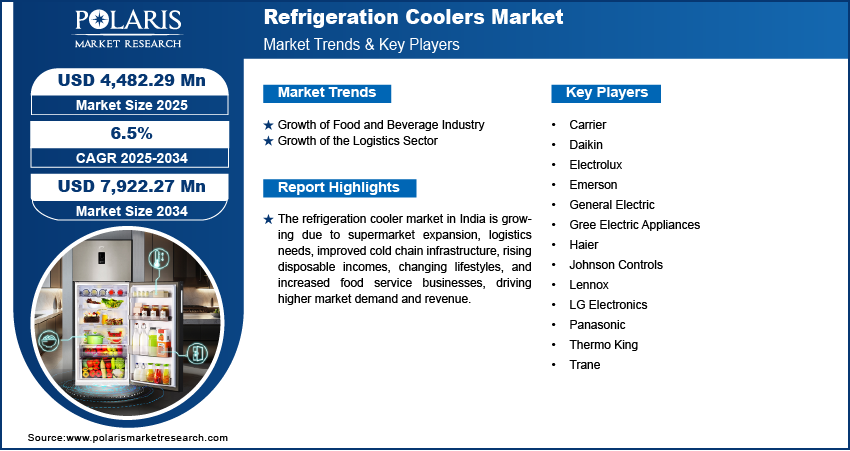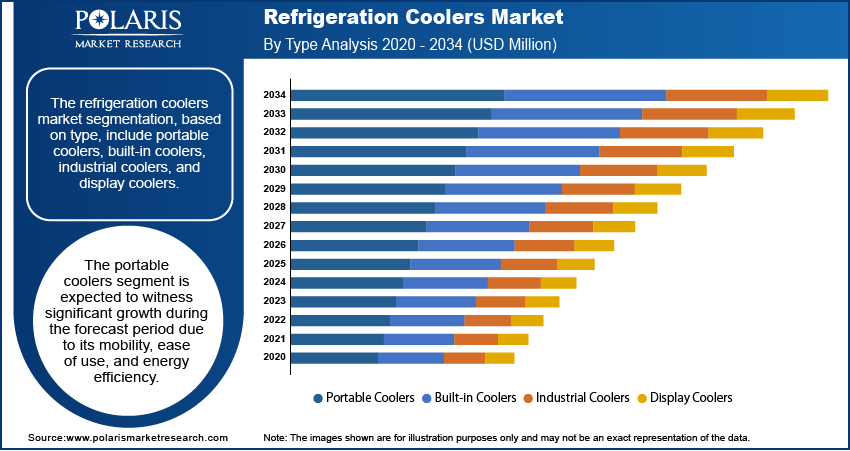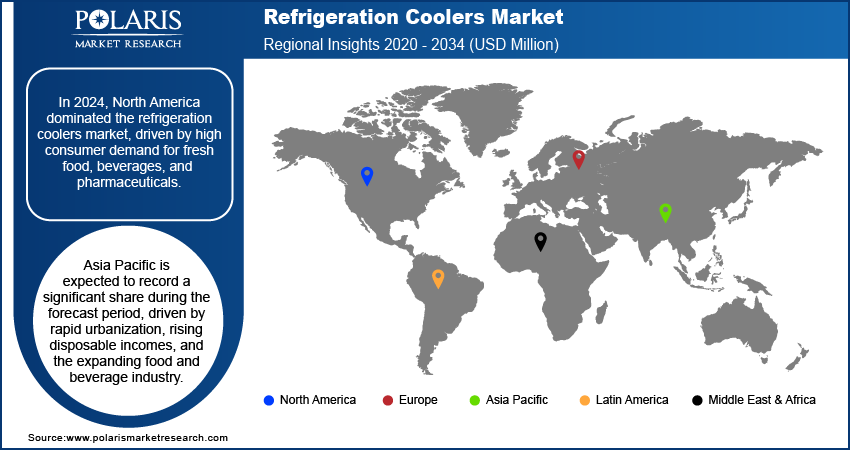
Refrigeration Coolers Market Size, Share, Trends, Industry Analysis Report: By Type, Technology, Application, End Use (Residential, Commercial, and Industrial), and Region (North America, Europe, Asia Pacific, Latin America, and Middle East & Africa) – Market Forecast, 2025–2034
- Published Date:Apr-2025
- Pages: 125
- Format: PDF
- Report ID: PM5478
- Base Year: 2024
- Historical Data: 2020-2023
Refrigeration Coolers Market Overview
Refrigeration coolers market size was valued at USD 4,213.60 million in 2024. The market is projected to grow from USD 4,482.29 million in 2025 to USD 7,922.27 million by 2034, exhibiting a CAGR of 6.5% during the forecast period.
Refrigeration coolers are devices used to lower the temperature of air or liquids, typically in commercial or industrial settings, to preserve perishable goods. They work by using a cooling system to transfer heat from the inside to the outside environment, maintaining optimal storage conditions.
The global population growth has led to a significant increase in the demand for perishable goods such as fresh food, dairy, fruits, vegetables, and pharmaceuticals. These products require proper storage to maintain their quality, freshness, and safety. Refrigeration coolers are essential in extending the shelf life of perishable items. Cold storage units in grocery stores, supermarkets, and food distribution centers play a key role in keeping food fresh and preventing spoilage. As more people turn to fresh and perishable goods for their diets and health, the demand for refrigeration coolers is increasing, fueling the refrigeration coolers market expansion.

To Understand More About this Research: Request a Free Sample Report
Governments and regulatory bodies worldwide have enforced strict food safety standards to ensure that perishable goods are stored at the proper temperatures, preventing contamination and spoilage. These regulations cover storage in food processing, transportation, and retail environments. Refrigeration coolers play a crucial role in meeting these standards, ensuring consistent temperature control that prevents foodborne illnesses and maintains product quality. The growing emphasis on compliance with food safety laws has increased the demand for reliable and advanced refrigeration solutions, thereby expanding the refrigeration coolers market demand.
Refrigeration Coolers Market Dynamics
Growth of Food and Beverage Industry
The food and beverage industry is growing, due to which the demand for refrigeration coolers is rising. According to the US Bureau of Labor Statistics, in 2023, the US alone employed 4,942,100 people in the food and beverage industry, showcasing the growth of the food and beverage industry. This is driving the demand for refrigeration coolers for food processing, packaging, and transportation. Additionally, supermarkets, restaurants, and warehouses depend on these coolers to store and display food safely. Global growth in both production and consumer demand for food makes refrigeration systems even more critical for maintaining food quality and safety, consequently driving the refrigeration coolers market growth.
Growth of the Logistics Sector
The growth of the logistics sector is boosting the demand for refrigeration coolers. According to the European Commission, in Europe alone logistics sector employs 10.2 million people, showcasing the growth of the logistics sector. The transportation of perishable goods such as food, pharmaceuticals, and flowers require refrigerated fleets to maintain product freshness and quality. These refrigerated vehicles ensure that goods are kept at optimal temperatures during transit, preventing spoilage. Global trade expansion and the rise of e-commerce further increase the need for efficient cold-chain logistics. To meet the demands of rapid delivery and long-distance transportation, logistics companies are investing in refrigeration systems for their fleets, thus fueling the growth of the refrigeration cooler market revenue.

Refrigeration Coolers Market Segment Analysis
Refrigeration Coolers Market Assessment by Type
The refrigeration coolers market segmentation, based on type, includes portable coolers, built-in coolers, industrial coolers, and display coolers. The portable coolers segment is expected to witness significant growth during the forecast period due to its mobility, ease of use, and energy efficiency. They serve a variety of industries, including food delivery, catering, and outdoor events, where maintaining temperature control is essential. Their compact design allows for easy transportation, making them ideal for businesses and consumers who need to keep products cool while on the move. Growing demand for portable and flexible cooling solutions across various sectors is driving the segmental growth in the market.
Refrigeration Coolers Market Evaluation by Application
The refrigeration coolers market segmentation, based on application, includes food and beverage, pharmaceuticals, chemical storage, and agriculture. The food and beverage segment dominated the market in 2024. This industry depends on refrigeration systems to safely store and preserve perishable items such as meat, dairy, fruits, vegetables, and beverages. Supermarkets, restaurants, and food distribution centers rely on these coolers to ensure product quality, prevent spoilage, and extend shelf life. Increased consumer demand for fresh and processed food contributes to the growing need for reliable refrigeration solutions. Additionally, rising concerns about food safety and the need for efficient supply chain management are further driving the demand for refrigeration coolers in the food and beverage sector.

Refrigeration Coolers Market Regional Insights
By region, the study provides the refrigeration coolers market insights into North America, Europe, Asia Pacific, Latin America, and the Middle East & Africa. In 2024, North America dominated the market, driven by high consumer demand for fresh food, beverages, and pharmaceuticals. The food and beverage sector, along with the pharmaceutical industry, requires reliable refrigeration solutions for storage and transportation. The presence of advanced technologies, along with strict food safety regulations, encourages businesses to invest in efficient refrigeration systems. Additionally, the growing logistics and transportation industry in the region, which requires refrigerated fleets for goods delivery, boosts the demand for refrigeration coolers.
Asia Pacific is expected to record a significant refrigeration coolers market share during the forecast period. Rapid urbanization, rising disposable incomes, and the expanding food and beverage industry are driving the demand for refrigeration coolers. Countries such as China, Japan, and South Korea are witnessing a boom in retail stores, supermarkets, and food service businesses, increasing the need for refrigeration systems. Additionally, the growing logistics and cold chain infrastructure in the region for safe storage and transportation of perishable goods is further driving the demand for coolers, thereby driving the market in Asia Pacific.
The refrigeration coolers market in India is experiencing substantial growth driven by the expansion of supermarkets and retail chains that require advanced refrigeration solutions. Additionally, India's logistics industry is expanding, which necessitates refrigerated transport for perishable goods. The government's focus on improving cold chain infrastructure and food safety regulations further expands the use of refrigeration coolers. Rising disposable incomes, changing lifestyles, and an increasing number of food service businesses also fuel the demand for refrigeration coolers. As a result, the refrigeration coolers market revenue in India is growing.

Refrigeration Coolers Market Key Players & Competitive Analysis Report
The refrigeration coolers market opportunity is constantly evolving, with numerous companies striving to innovate and distinguish themselves. Leading global corporations dominate the market by leveraging extensive research and development, and advanced techniques. These companies pursue strategic initiatives such as mergers, acquisitions, partnerships, and collaborations to enhance their product offerings and expand into new markets.
New companies are impacting the industry by introducing innovative products to meet the demand of specific market sectors. According to the refrigeration coolers market stats, this competitive trend is amplified by continuous progress in product offerings. Major players in the refrigeration coolers market include Thermo King, Gree Electric Appliances, General Electric, Daikin, Haier, LG Electronics, Carrier, Johnson Controls, Trane, Lennox, Panasonic, Emerson, and Electrolux.
Daikin Industries, Ltd. is a Japanese multinational company based in Osaka, Japan. Established in 1924, it is a major manufacturer of air conditioners and provides various air conditioning and refrigeration Accessories. Daikin operates globally, offering a range of products, including air conditioning systems, refrigerants, chemicals, oil hydraulics, defense systems, and medical equipment. Its product portfolio includes residential and commercial air conditioners, air purifiers, large-sized chillers, and marine vessel air conditioners. Additionally, Daikin produces chemicals such as fluorocarbons, fluoroplastics, and fluoroelastomers, as well as pharmaceutical intermediates. The company also manufactures industrial hydraulic equipment and mobile hydraulic systems and produces home-use oxygen therapy equipment and rebreathers in its medical equipment division. Furthermore, it manufactures components for guided missiles in its defense systems segment. Daikin is involved in the development and manufacturing of both air conditioners and refrigerants, which is a notable aspect of its operations. The company operates in multiple regions, including Asia, where it has significant operations in Japan, China, Southeast Asia, and India. In Europe, Daikin has a presence with various subsidiaries and manufacturing facilities. It entered the North American market and expanded through acquisitions such as McQuay International. Daikin also operates in Africa, with operations in Egypt and other regions, and maintains a presence in Latin America and Oceania. The company's global operations are supported by a network of over 349 consolidated subsidiaries and a sales and service network across more than 150 countries.
General Electric (GE) was a multinational conglomerate founded in 1892, originally incorporated in New York and later headquartered in Boston. Over its history, GE has operated across multiple sectors, including aerospace, energy, healthcare, lighting, locomotives, appliances, and finance. In 2021, GE announced it would split into three separate companies, which include GE Aerospace, GE HealthCare, and GE Vernova, with GE Aerospace taking over the General Electric name and ticker symbols. This decision was part of a broader strategy to reorganize its operations. GE's product portfolio includes aircraft engines, energy solutions, medical imaging equipment, financial services, software solutions, and renewable energy technologies. GE Aerospace focuses on commercial and military aircraft engines, while GE Vernova handles power, wind, and electrification technologies. GE Healthcare provides medical imaging equipment and healthcare services. The company's software division, GE Digital, offers industrial software solutions. General Electric had a global presence, operating in over 100 countries. After the split, each new company continues to operate internationally. GE Aerospace is involved in aviation globally, GE HealthCare serves healthcare markets worldwide, and GE Vernova operates across more than 100 countries, focusing on energy solutions. GE's global reach allowed it to maintain a presence across diverse regions and industries. GE Appliances offers wine and beverage centers with features like adjustable shelves, dual-zone temperature control, LED lighting, and design for freestanding or built-in use.
Key Companies in Refrigeration Coolers Market
- Carrier
- Daikin
- Electrolux
- Emerson
- General Electric
- Gree Electric Appliances
- Haier
- Johnson Controls
- Lennox
- LG Electronics
- Panasonic
- Thermo King
- Trane
Refrigeration Coolers Market Developments
October 2024: PRO Refrigeration launched the PRO Chiller PRO4 Series. This series features advanced cooling technology, a modular design, a reduced footprint, and real-time remote monitoring, and it aims to improve efficiency in dairy and other industries.
December 2024: Samsung unveiled its new refrigerators with AI Hybrid Cooling technology at CES 2025. They showcase advanced energy efficiency, enhanced food preservation, and improved internal space and are set to launch globally.
November 2023: Daikin unveiled its new full-electric and plug-in hybrid transport refrigeration lineup at SOLUTRANS in Lyon. The lineup showcases innovative, eco-friendly solutions designed to reduce emissions in transport refrigeration systems.
Refrigeration Coolers Market Segmentation
By Type Outlook (Revenue USD Million, 2020–2034)
- Portable Coolers
- Built-In Coolers
- Industrial Coolers
- Display Coolers
By Technology Outlook (Revenue USD Million, 2020–2034)
- Vapor Compression
- Thermoelectric
- Absorption
- Magnetic Refrigeration
By Application Outlook (Revenue USD Million, 2020–2034)
- Food and Beverage
- Pharmaceuticals
- Chemical Storage
- Agriculture
By End Use Outlook (Revenue USD Million, 2020–2034)
- Residential
- Commercial
- Industrial
By Regional Outlook (Revenue USD Million, 2020–2034)
- North America
- US
- Canada
- Europe
- Germany
- France
- UK
- Italy
- Spain
- Netherlands
- Russia
- Rest of Europe
- Asia Pacific
- China
- Japan
- India
- Malaysia
- South Korea
- Indonesia
- Australia
- Rest of Asia Pacific
- Middle East & Africa
- Saudi Arabia
- UAE
- Israel
- South Africa
- Rest of Middle East & Africa
- Latin America
- Mexico
- Brazil
- Argentina
- Rest of Latin America
Refrigeration Coolers Market Report Scope
|
Report Attributes |
Details |
|
Market Size Value in 2024 |
USD 4,213.60 million |
|
Market Size Value in 2025 |
USD 4,482.29 million |
|
Revenue Forecast in 2034 |
USD 7,922.27 million |
|
CAGR |
6.5% from 2025–2034 |
|
Base Year |
2024 |
|
Historical Data |
2020–2023 |
|
Forecast Period |
2025–2034 |
|
Quantitative Units |
Revenue in USD million and CAGR from 2025 to 2034 |
|
Report Coverage |
Revenue Forecast, Market Competitive Landscape, Growth Factors, and Industry Trends |
|
Segments Covered |
|
|
Regional Scope |
|
|
Competitive Landscape |
|
|
Report Format |
|
|
Customization |
Report customization as per your requirements with respect to countries, regions, and segmentation. |
FAQ's
The refrigeration coolers market size was valued at USD 4,213.60 million in 2024 and is projected to grow to USD 7,922.27 million by 2034.
The global market is projected to register a CAGR of 6.5% during the forecast period, 2025-2034.
North America had the largest share of the global market in 2024.
The key players in the market are Thermo King, Gree Electric Appliances, General Electric, Daikin, Haier, LG Electronics, Carrier, Johnson Controls, Trane, Lennox, Panasonic, Emerson, and Electrolux.
The food and beverage segment dominated the refrigeration coolers market in 2024. The industry depends on refrigeration systems to safely store and preserve perishable items such as meat, dairy, fruits, vegetables, and beverages.
The portable coolers segment is expected to witness significant growth during the forecast period due to its mobility, ease of use, and energy efficiency.
